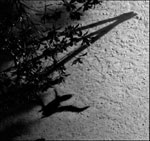Max Richter : The Blue Notebooks (130701 Records. Cd13-04p)
Roberto Bonati : The Blanket Of The Dark (MM Records. MM43033)

Richter’s work follows the releases by Set Fire To Flames and Sylvian Chauveau on FatCat’s 130701 imprint. He has chosen to use words sparsely, the work of Polish poet Czeslaw Milosz is integrated, along with parts of Kafka’s text ‘The Blue Octavo Notebooks’, into the dreamlike landscapes he constructs. The words are read quietly and fairly unobtrusively by Tilda Swinton, against the sound of a typewriter, and her delivery is perfect, clearly enunciated and with just sufficient detachment. Since the texts are short and out of context they may be read like jottings from a journal or diary and conjure their own images independent of the sources. Kafka’s ‘Notebooks’ provide the opening text, ‘Everyone carries a room about inside them’ leaving the listener with the image of ‘the rattling of a mirror not quite firmly fastened to the wall’. Whatever resonances the words leave they are complemented by the subtlety of the music, in this instance echoing piano with judicious use of found materials .
‘Shadow Journal’ blends images of the present’s ‘sepulchral brick’ alongside momentary flashes of memory, using the whole of Milosz’s ‘At Dawn’ along with Richter’s limpid keyboards and one lone soaring violin. There are other found sounds here too, unidentifiable but integral. The city is Paris but it might be any European city, as the voice says : ‘I cast a spell on the city asking it to last’ New urban pictures rise out of the combination of word and music. And on ‘Arboretum’ there may only be a couple of lines but they are clear and suggestive, in this case of an autumnal landscape, and lead in to the melancholic minimalism of Richter’s soundscape.
Much of the music is cinematic and sketches moments of contemplative or dream states, like ‘Iconography’ which features no text and frankly doesn’t need one as a choral arrangement illuminates a shimmer of organ music. Again, the sounds are redolent of place, even though the exact location may differ according to each listener.
Restraint and economy are tools which Richter wields creatively on the piano solos, ‘Vladimir’s Blues’ and ‘Written On The Sky’ though, equally, he draws on a broader palette for the dolorous atmosphere of ‘The Trees’. Once more the piano and violin/viola/cello create a haunted beauty that becomes more disturbed and intense as the track progresses.
By virtue of the texts he’s chosen and some of the instrumental settings he has built around them there is an inevitable evocation of lost or buried landscapes and cities. The writers may have been firmly 20th century European but Richter’s compositions are just as suggestive of the present as of that time.
A text that seems to have perpetual relevance wherever a dictatorship prevails, ‘Macbeth’ has been the subject of numerous musical ‘interpretations’. Remember the Third Ear Band’s soundtrack to Polanski’s film version in 1971? Perhaps not. Anyway this latest attempt to grapple musically with the play takes its voice from the viewpoint of Lady Macbeth rather than the eponymous butcher himself.
Bonati has used extracts from her speeches and woven round them a dark, episodic musical score which in places is extremely successful in creating that dismal corner of the northern world in which the play is set. Lady M’s solitary stance is evident in the lupine wail of Vincenzo Mingiardi’s electric guitar as it rises out of the turmoil on ‘Murdering Ministers’. Though the atmosphere created on ‘Thick Night’ is less threatening than it ought to be and doesn’t quite conjure ‘the dunnest smoke of hell’, Bonati’s arrangement for ‘Flower and Serpent’ is aptly duplicitous, creeping in a manner that may not be wholly threatening but nevertheless plants a sense of unease that spills over into ‘Daggers’ which contains edgy piano, trumpet and Marco Remondini’s sax within the jagged, thrust of the ensemble.
The isolation of the Macbeths is brought into focus on ‘La Danse’ especially it’s first section, ‘The Cheer’ where the music is woozily representative of a bad party from which the host is conspicuously absent in morbid brooding as the hostess tries to woo him back. But while the music may be exactly right in conveying these atmospheres, I’m afraid the vocals, by Lucia Minetti, leave me feeling less convinced. She sometimes sounds solemn in the wrong places whilst overdoing the madness in an all too hysterical voice which the words don’t demand. This happens on a number of pieces and is, for me, a weak spot in the performance. Nonetheless, it is more than made up for by sections such as ‘Paintings Of Your Fear’ on which pianist Stefano Battaglia summons a set of demonic visions to jolt the listener back to the horror of the play.
The final, text-based, track, ‘Sonnambula’ sets out to re-imagine Lady Macbeth’s final insanity when she is more or less alone with her guilt. The text, is harrowing but Minetti again isn’t that convincing and it is up to the impeccable musicianship of Beppe Caruso’s trombone, Alessandro Benassi’s clarinet and Mario Acari’s oboe to inject the tension and madness into the performance.
Musically, Bonati has constructed a spectrum which certainly matches the imagery of the play’s language and revitalises it, though overall I still feel that an interpretation like this would stand successfully without the vocal contributions.
© 2004 Paul Donnelly